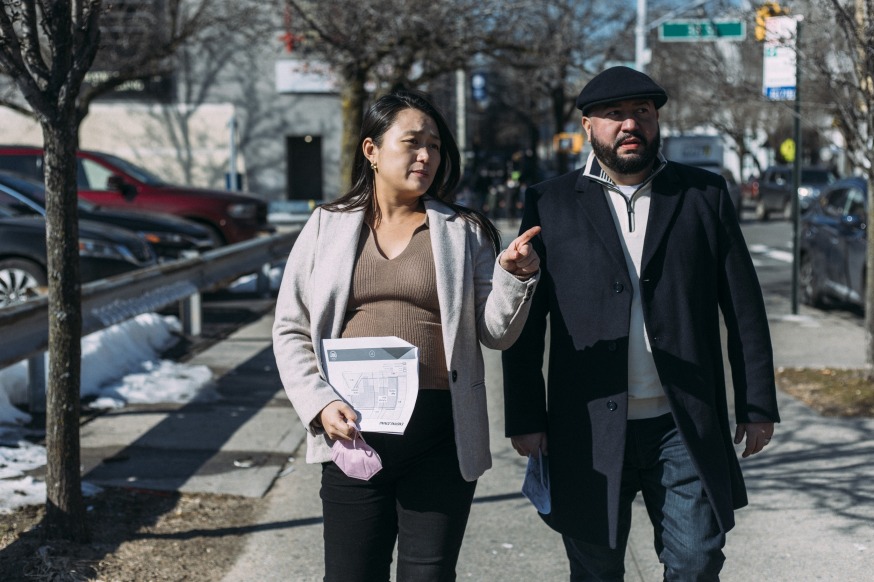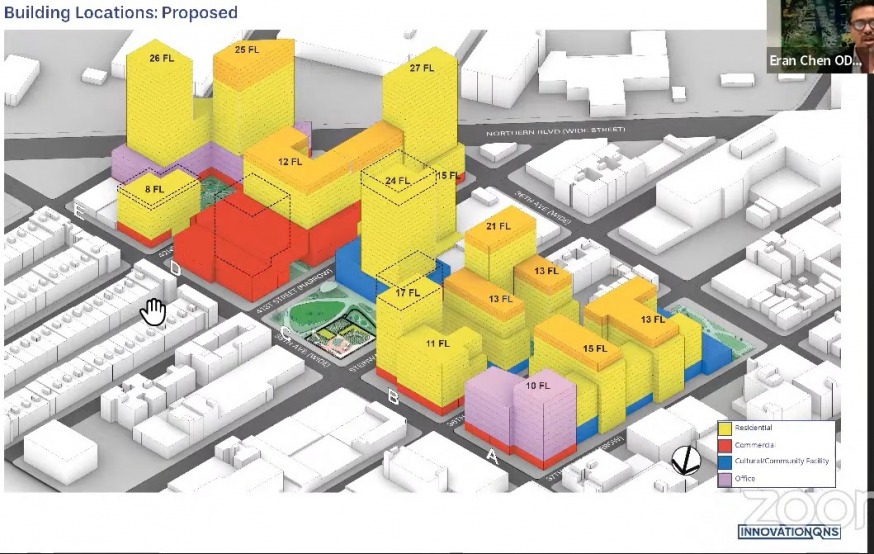
Council Member Julie Won takes Council Member Rafael Salamanca on a tour of some of the large development sites in the 26th District. In this photo they are walking along 35th Avenue by 38th Street, where a development team plans to build Innovation QNS (Photo: Courtesy of CM Julie Won)
Aug. 3, 2022 By Christian Murray and Czarinna Andres
Councilmember Julie Won has put together an extensive list of guidelines—with input from non-profit leaders and community organizations– that developers must adhere to when seeking a rezoning in order to get her support in the city council.
Won, who was a Community Board 2 member prior to being elected, says the document aims to democratize the rezoning process, providing the community with greater input as to what is deemed appropriate for development. She said past rezoning decisions were left almost exclusively in the hands of councilmembers and were less “community driven.”
The guidelines she has created is what she refers to as a “living document” that she says will change with the needs of the district and city.
“As an office, we partnered with nonprofit partners to craft our land use principals document and have socialized it with the City Council Land Use division as well as other community partners,” Won told the Queens Post. “This is a living document that will continue to evolve as our community also continues to evolve.”
The guidelines essentially call on developers to do more than what is standard today in order to get their rezoning applications approved. She is calling for greater community outreach (in multiple languages), offer affordable units at deeply affordable levels and to invest in public services.
Won’s guidelines are important since she will ultimately determine the fate of rezoning applications in the 26th Council district, which covers Sunnyside, Woodside, Long Island City and parts of Astoria. The council, which must approve all rezonings, typically votes in lockstep with the representative where a development is proposed in what’s known as member deference.
“We released our land use principles to promote our community’s role in building new developments in our district and bring transparency to the land use process. We want to make sure that developers meet the minimum requirements to do business with our district: community engagement, affordability, and community investment.”

A broad outline of the guidelines presented by Councilmember Won (Source: CM Julie Won)
Won said she wanted to provide context as to what will underpin her land use/rezoning decisions—including factors that will influence her decision pertaining to the massive Innovation Queens rezoning proposal, which is currently undergoing public review and would bring 2,800 units to a five-block manufacturing district in Astoria if approved.
The developers of Innovation QNS, which certified their rezoning application April 25, have been criticized by Won for falling short in terms “community engagement” and for not offering more affordable housing than what the city requires. (See Councilmember Won’s Editorial in the Astoria/Queens Post)

Rendering of Innovation QNS as presented to Community Board 1’s Land Use & Zoning Committee on June 1 (screenshot)
The community engagement concept in Won’s guidelines would require developers to work with residents, community organizations and businesses—in multiple languages–prior to certifying their development. The certification process kicks off the public review process.
Developers, she said, should consult with local nonprofits such as the Western Queens Community Land Trust, Ravenswood Land Trust, the Justice 4 All Coalition and and civic groups such as the Court Square Civic Association, Dutch Kills Civic Association etc. The developers would also be required to notify the community of any expected impacts.
The affordability component of the document would require developers to provide more income restricted units—at lower income levels—than what is required under Mandatory Inclusionary Housing, where developers are required by the City to provide affordable housing as part of a rezoning application.
Developers often meet the MIH Option 1 requirement by setting aside 25 percent of the units an average Area Median Income of 60 percent, equating to $80,040 for a family of four. The AMI, however, is based on incomes from the New York region not per community board district.
Won says that the 60 percent AMI figure is too high for local residents and developers need to make the average income level lower and offer more units. She said 53 percent of the residents in Community Board 1 and 2 earn less than $75,000 per year and that 25 percent of households in Council District 26 make less than $35,000.
“For years, our community has debated the meaning of deep affordability with developers, which we didn’t see come into fruition,” Won told the Queens Post. “In District 26, 90 percent of the units built [in 2020] were market rate. Eighty-seven percent of my residents are renters and 60 percent of them are rent burdened or severely rent burdened.”
She said that new developments should address the needs of seniors and should also prioritize two- and three-bedroom apartments that accommodate families. Also, commercial rents should be affordable and accommodate mom & pop shops, she said.
Won said that developers also need to invest in public infrastructure that matches the scale of a given project, including schools, parks, sewage, etc. She also said new development should be carbon neutral and that the developers should use union labor.
Won says that developers have often run roughshod over the community in the past.
“As a former community board member, I witnessed time and time again how developers came into our district and dismissed the community’s input. In the past, former elected officials frequently made unilateral decisions,” she told the Queens Post.
Won said the guidelines set the minimum requirements developers must meet to get her blessing.
She said the guidelines are needed since District 26 is undergoing heavy development and the affordability crises has worsened.
“The city’s current land use process often forces communities into making an impossible decision—either accept a proposal that did not originate from the community or reject it in full. Therefore, we have outlined key principles…to address our community’s needs and concerns which have surfaced repeatedly over the years.”
13 Comments

Cool, legal extortion.
Still voting for Crowley!
Is Julie referring to Van Bramer regarding the statement: “She said past rezoning decisions were left almost exclusively in the hands of councilmembers and were less ‘community driven.’ “. I agree. Van Bramer had his own personal agenda at the expense of his constituents on so many issues. He is missed as much by Sunnyside & Woodside as di Blasio is, although the neighborhood unfortunately has to live with the quality of life of his personal decisions for years to come.
Why didn’t Julie Won actively assist with stopping the Barnett Avenue project that the high majority of the community was opposed to when Van Bramer was pushing it through anyway? She did not show up to a single rally with the residents of her own housing complex. Her absence and silence was very noticeable. Again, where were you?
Those rallies were organized by the pariah and political cancer Pat D. Julie would not have won the election if she had appeared.
Julie should have stood alongside her neighbors, and voters, in Phipps Apartments. Now she has moved out of the complex and we are left with the parking problem this will create forever.
Let that sink in. Pat tried putting in buzzwords like gentrification, but in the end it was all about her parking. Thank goodness it didn’t work.
because she is getting money in her pockets as well – just like JVB – it never ends
I am all for anything that helps poor blk and brn people and low skilled workers pay rent.
How about taking care of the housing that is already up? My internet went out yesterday again. Also its too hot without air conditioning.
Internet is going to go down once in a while when everyone else is jamming it.
Good for Council Member Won. Now why don’t state elected officials revise or scrap MCIs?
Now the nonprofits people will get pay offs too and or the developers will go else where. Can’t say I disagree with everything she is doing thou.